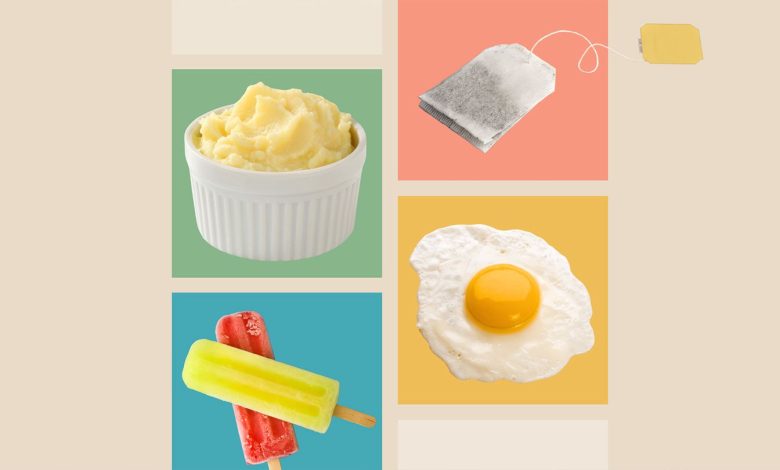What to Eat and Drink for a Sore Throat

[ad_1]
Sore throat is usually a symptom of a viral infection, such as cold and flu, RSV, and COVID-19. During the fall and winter, when respiratory viruses circulate widely, throat irritation and pain are a common source of misery.
Shane Reynolds, a physician assistant with Banner Urgent Care in Peoria, Arizona, sees upward of 60 patients a day during respiratory virus season, and estimates that about 80 percent have sore throats. “A lot of times the sore throat comes first, and then a couple of days later, patients get congestion, runny nose, and cough,” says Reynolds.
Of course, sore throats aren’t just a winter problem. In the spring, Reynolds starts seeing sore throats related to allergies, when pollens and molds thrive and spread. Plus, anyone who has ever been hit with a summer cold knows that sore throat is a four-season issue.
No matter when or why, when your throat starts to hurt, what you eat and drink may make a difference. Some foods and drinks ease pain, while others aggravate discomfort; certain foods and drinks nourish your body and strengthen your immune system, while others may undermine your recovery.
Read on for some guidance from healthcare practitioners and researchers on foods and drinks that may help soothe a sore throat, plus a checklist of foods and beverages to avoid. Finally you’ll see tips for when to know that a sore throat could be strep throat, requiring antibiotics.
What to Eat and Drink When Your Throat Hurts
1. Oatmeal
Warm, soft foods like oatmeal (and its cousins porridge, grits, and cream of wheat) are a soothing choice for someone with a sore throat, according to Robert H. Hopkins Jr., MD, the medical director of the National Foundation for Infectious Diseases. “Soft foods go down easy and are less likely to irritate,” he says.
On top of that, oatmeal can boost digestive health, and it’s packed with B vitamins and minerals (such as manganese, iron, magnesium, and zinc) that can bolster immunity and energize the body.
2. Eggs
Dr. Hopkins recommends eggs (scrambled, fried, soft-boiled, or otherwise) as a good choice for someone with a sore throat because they are warm, soft, and easy to swallow.
3. Mashed Potatoes
4. Warm Broth or Soup
“Soups can be very comforting with a sore throat,” says Reynolds. The steam from soup may open up congested noses and throats, and provide fluid, which thins mucus and helps prevent dehydration.
Warm liquids definitely help with sore throat. In one small pilot study, scientists examined the effects of a hot and room-temperature drink (specifically, a diluted grape juice beverage) in 30 people who had symptoms of a common cold or flu-like illness.
5. Lemon Water
Good hydration is important when you’re battling a virus, and it may ease pain. Hydration helps fight inflammation, flush toxins, thin mucus, and keep the throat moist.
A squeeze of lemon can help make water taste better. Plus, lemons are an excellent source of vitamin C, which may give the immune system a boost.
6. Hot Tea
Because caffeine in tea and coffee can have a mild diuretic effect (reducing fluid in the body), Christine Nguyen, DO, a family physician with the Mayo Clinic in Jacksonville, Florida, suggests avoiding caffeinated drinks and opting for herbal or decaffeinated teas instead.
7. Honey Mixed Into Warm Water or Tea
Pritish K. Tosh, MD, an infectious-disease specialist with Mayo Clinic, calls honey a time-honored way to soothe a sore throat and an effective natural cough suppressant, coating the throat and lessening irritation.
8. Popsicles
Foods and drinks that are cool tend to help reduce swelling, doctors say, which can ease some of the pain of a sore throat. Items like Popsicles also help prevent dehydration.
“We definitely use Popsicles with kids who have sore throats, as the cool and the liquid helps,” says Jeffrey Druck, MD, an emergency physician with University of Utah Hospital in Salt Lake City. Jell-O and smoothies are other good choices.
Cold foods like yogurt and ice cream can also soothe a sore throat, as long as you’re not lactose intolerant, says Hopkins, adding that in some cases, milk and milk products can increase mucus production.
Foods to Avoid When You Have Sore Throat
When you have a sore throat, certain foods just won’t be appealing to you, or may worsen your throat pain. Others can be dehydrating.
Some of the reported culprits are:
- Hard, crunchy foods Avoid sharp-edged snacks or foods with craggy surfaces like toast, chips, crackers, pretzels, popcorn, carrot sticks or other raw vegetables, and fried foods.
- Spicy foods These will hurt your throat, although some people claim they can “short-circuit” throat pain.
- Alcohol and caffeinated drinks These are dehydrating. Note that some energy drinks contain caffeine and should be avoided.
- Sodas The acidity and fizz of carbonated drinks may irritate the throat.
When to See a Doctor for a Sore Throat
While most sore throats clear up on their own over the course of several days, sometimes they are a sign of something more serious. In some instances, a bacterial infection such as strep throat can be the cause.
Strep throat can be harsher than your average sore throat, accompanied by symptoms such as fever, body aches, chills, and swollen lymph nodes in addition to difficulty swallowing. In these cases, antibiotics are needed to treat the infection and prevent rheumatic fever and other complications.
- Difficulty breathing
- Blood in saliva or phlegm
- Excessive drooling (in young children)
- Dehydration
- Difficulty swallowing
- Joint swelling and pain
- Rash
[ad_2]




